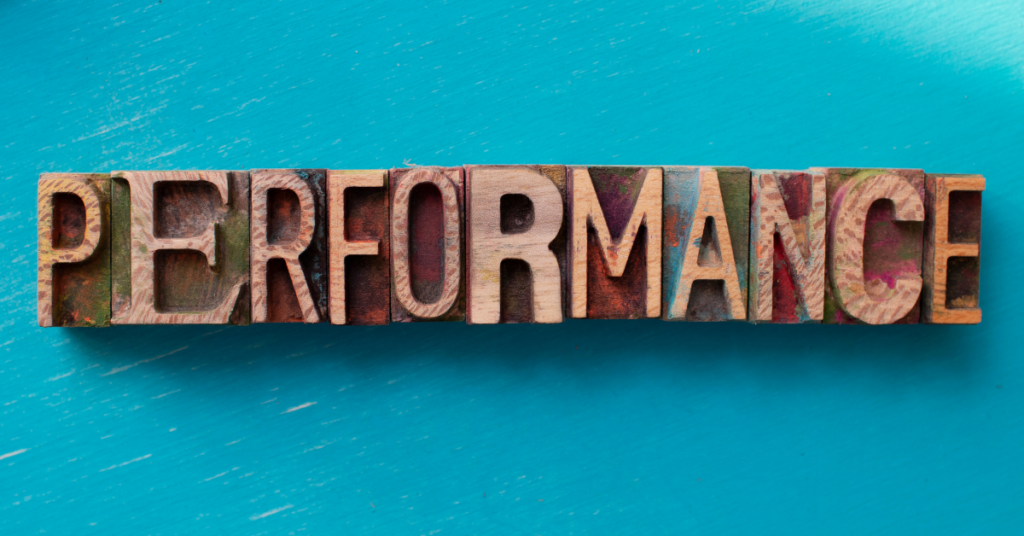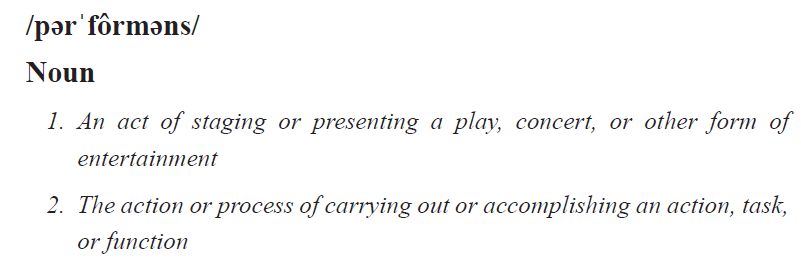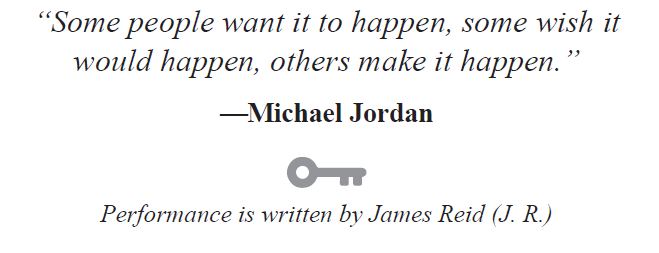Performance



Peak performance. High performance. Horrible performance. Great performance. How many phrases with the word performance have you heard? Performance has become a buzz word. Ambitious individuals and athletes can’t stop thinking about it. Growth-minded companies can’t seem to operate without the latest gadget advertised to boost it.
The problem is, most people treat performance like a magic pill. “Do this performance technique, and you’ll go to the next level.” “Train your
employees with these performance tactics, and your business with double its revenue.” I hate to break it to ya, but there’s no such thing as a magic, cookie-cutter performance pill.
Performance relies on your unique ability to perform. Noticeably, perform is the root word of performance, and it means to “carry into effect, fulfill, discharge.”
Therefore, if you don’t have the ability to perform, you won’t be able to carry into effect anything at the level you want and will likely fall short of your ultimate goal. That raise you want…that business growth you set out to have…that championship you want to win…that deeper relationship you envisioned…
It’s like the 150-pound teenage boy who has never lifted anything heavier than fifty pounds. He takes a steroid because he wants to match his peers’ ability to lift a car. He could pop the pill, but that car still ain’t movin’ because he doesn’t have the ability to lift it!
Let me say this again—because most don’t get it the first time. Your performance relies on your ability to perform.
So, how do you know if you have the ability to perform?…especially at the highest levels possible? You begin to work—on yourself…on your dream…on that thing you want to master or be known for. And you don’t stop at the first instance of negative feedback—from yourself or others. This is where most people screw up. They stop working to uncover and improve on an ability that is hidden in their DNA, waiting to be groomed. They fall into the mindset of “This is how it’s always going to be” or “Those genes don’t run in my family.”
It’s the same type of person who takes a personality assessment and believes what the thirty-page, auto-generated report says is final…that there’s no room for change.
What happens is they miss out on factors like these:
- All the feedback that comes with failing during the journey
- Lessons in humility
- Learning to ask for help
- Clarity surrounding what skills and talents they are passionate about and can master
- Overcoming adversity
All because, at first blush, they didn’t appear to have the ability. Then, later, they lament, “This could have been me.” I remember as a young high- school athlete, I was told I didn’t have the ability to play college baseball at the highest levels. These naysayers were basing their opinions on my current ability, not on my future capacity to perform. So I sought out coaches, drills, mentors, examples…everything I could get my hands on to uncover the truth about my ability to play college baseball.
After eighteen months of blisters, self-doubt, trial, error, and getting beat by my peers, I got the feedback I needed. I had the ability. It was just a matter of continuing to search for those habits and strategies that would work, for me, in grooming that ability. You must understand—what works for others doesn’t necessarily work for you.
You must find what works for you. Shortcuts don’t exist when it comes to your best performance. And if my story doesn’t convince you, just ask Michael Jordan, one of the greatest basketball players to have ever played the game. He had to first uncover that he had athletic ability to play basketball… because many told him he didn’t.
To do so, Michael had to identify the habits and strategies that worked for him—the ones necessary to perform at his highest levels. Then he had to commit to them…every day. And when he stepped onto the court to attempt his best possible performance, he had to “carry into effect, fulfill, discharge” all those habits and strategies he so diligently worked to own.
He realized performance started within. Again, no magic pill. No cookie-cutter tactic. And now he’s part of history. In fact, he’s a legend in sports—his legacy lives on. Did you catch that? Legacy is the by-product of
consistent, high-level performance. Do you want to leave a legacy? In the marketplace? In sports? At home? I know you do.
So let’s uncover your abilities—the ones necessary for you to perform at your highest levels and leave your legacy with four P’s. Let’s call this the Four-Step Plan to Your Greatest Performances (yes, plural!):
- Prepare. Identify what you want to master, and then determine what you believe will help you uncover your unique ability to perform in that area. Feel free to study what habits and tools others used to help them, but be willing to adapt them to fit yourself.
- Play. You have to put your preparation to the test. Take what you’ve worked on, and then get in the game! Take a leap of faith, for cryin’ out loud!
- Persist. You’re bound to fail. But the highest-performing people in this world keep pushing through the failure because they know there is wisdom in it…wisdom that will help them readjust, reassess, and redo. Keep pushing. It’s for your own good.
- Permit. The performance journey is marked by reinvention, revolution, and resolution. Underperformers look for others’ permission to do some- thing. On the other hand, high performers give themselves permission to improve on their current state, go against the grain, and figure out why failure occurred.
Performance is not a one-time event leading to a specific outcome. It’s a journey leading to generations of impact.
Don’t rely on the pill or quick fix. Create your own magic, Baby!
